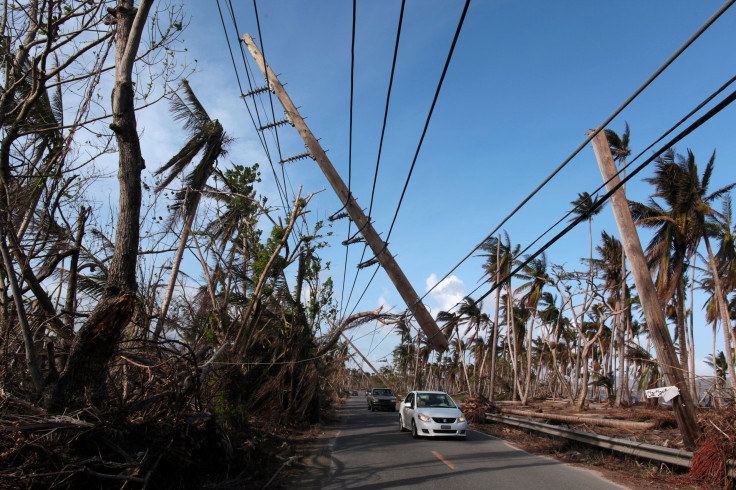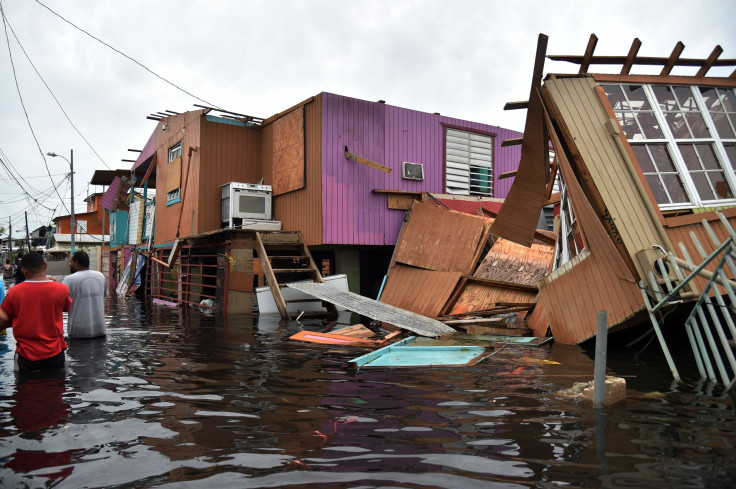Puerto Rico Crisis: Bond Insurers Fight To Avoid Paying Claims

While still struggling to remedy widespread power outages and destruction wrought by Hurricane Maria, the Puerto Rican government is working to restructure its debt. Insurers of those debt bonds, on the other hand, are at risk of having to pay out billions, and potentially taking a hit to their bottom lines — an outcome they’re seeking to avoid through a campaign of lobbying and litigation.
Ambac Financial Group, Assured Guaranty LTD and MBIA Inc., through its subsidiary National Public Finance Guarantee Corporation — all of which, for a premium, guarantee repayments to debt holders in the event of an issuer default — are collectively on the hook for upwards of $26 billion in Puerto Rican debt over the long term. In late September, as those on the island were just beginning to rebuild, the bond rating agency Moody’s Investors Service called the storm a “credit negative for financial guarantors that guarantee the interest and principal payments on a significant portion of Puerto Rico’s outstanding debt obligations,” naming the latter two insurers as the most vulnerable.
Following the approval of a $36.5 billion disaster relief package by the House and then the Senate, Sen. Bernie Sanders (I-Vt.) told the Intercept he was working on a proposal that would include forgiveness for Puerto Rico's obligations, which would leave it to the insurers to pay back a substantial portion of Puerto Rico’s debt and interest payments. Less than two weeks earlier, President Donald Trump’s ultimately empty promise to simply cancel all of Puerto Rico’s debts caused the three firms’ share prices to decline markedly, with MBIA’s taking the greatest drop, of 8.4 percent.
Assured Guaranty, which released its third-quarter results Friday, with Puerto Rican debt service exposure of $8.2 billion, warned shareholders in a filing with the Securities and Exchange Commission that “economic activity in general and tourism in particular, as well as tax collections, are all expected to decline in the short term” in the U.S. territory, while “migration to the mainland is also expected to increase.” The company’s $431 million in losses for the first nine months of 2017, the filing said, “was primarily attributable to Puerto Rico exposures.”
Assured Guaranty said in an emailed statement that the company's “liquidity and capital position are very strong,” and drew a line between debt service exposure, or “issuers’ scheduled principal and interest coming due over the next 30 years,” and net par exposure, which stood at $4.9 billion as of Sept. 30.
“Although the hurricanes have been a setback for near-term economic activity, very substantial Federal resources for relief and rebuilding are expected over the intermediate and longer term to stimulate economic activity and help to revive the Puerto Rico economy,” the company said, adding that “we unconditionally cover any shortfalls in scheduled payments by issuers.”
In its second- and third-quarter filings, released Tuesday, MBIA specifically named the island's debt problems as a likely cause of “losses or impairments on a greater number of the Company’s insured transactions.” Ambac, in its second-quarter report, bluntly informed shareholders that its Puerto Rico losses could exceed $1.6 billion.
Under Title III of the Puerto Rico Oversight, Management and Economic Stability Act (PROMESA), the Commonwealth already filed for bankruptcy in May, but the storm forced the board created by the law to revise its budget to accommodate for larger expenses and smaller revenues, which is bad for the bond insurers. As the capital markets research firm Height Securities LLC put it in an Oct. 31 report on Puerto Rico’s fiscal situation, “a 23 percent reduction in expected budgetary improvements would effectively erase PR’s ability to service any debt.”
“The interests of the government and the creditors and the monolines are not aligned,” Ed Groshans, of Height, told International Business Times. “The goal of the financial control board is not to enrich predators.”
Groshans said complete debt forgiveness was highly unlikely, but the bond insurers are not going to let their shareholders suffer losses from the island’s debt restructuring without a fight.
Immediately after the end of a freeze on creditor litigation under PROMESA, the Commonwealth faced a spate of lawsuits over its debt and budget restructuring, including two suits from Ambac, which also sued Treasury Secretary Steven Mnuchin. In total, Ambac racked up nine Puerto Rican debt-related litigation efforts by June 30, according to its second-quarter SEC filing.
The conflict stemmed in part from the Puerto Rican government’s plan to funnel sales taxes, meant to back so-called COFINA bonds, to its general obligation debt. MBIA — which, along with Ambac, Height named as especially in danger of substantial losses because of relatively larger COFINA exposures — and Assured Guaranty were also among the litigators, but withdrew their suit in the wake of Maria’s devastation. Holders of COFINA debt known as the COFINA Seniors Coalition, led by the Tilden Park Capital Management LP, GoldenTree Asset Management LP and investment advisory firm Whitebox Advisors LLC, have been locked in its own legal battle with officials and general obligation debtholders.

According to Tom Sanzillo, director of finance at the Institute for Energy Economics and Financial Analysis, who also didn’t see a full cancellation of Puerto Rico’s debt as a possibility, the legal fight is bound to continue.
“There’s going to be a lot of lawsuits going back and forth; it’s going to be a lot of fun for the lawyers,” he told IBT. “The optimal outcome for the insurers is a kind of grand settlement where everybody agrees to take less and the insurers take out a little less.”
The insurers aren’t just taking their concerns to court, but to Congress as well.
The Financial Guaranty Insurance Co., through the firm BGR Government Affairs, provided Congress with “strategic advice and counsel on issues regarding Puerto Rico's economy” during the third quarter, according to federal lobbying forms. Through the lobbying firm Mercury, the National Public Finance Guarantee Corp., a subsidiary of MBIA that handles the country’s Puerto Rico exposures, lobbied Congress on “Puerto Rico Debt Reform” and laws affecting the island’s debt restructuring over the same period, federal lobbying documents show.
In the second quarter, Assured Guaranty paid the firm Steptoe & Johnson LLP $300,000 to lobby Congress and the Treasury Department on “legislative proposals impacting Puerto Rico,” while the COFINA Seniors Coalition, via two lobbying firms during the first quarter, advocated for its interests related to the “Puerto Rico economic crisis” before Congress and the Treasury.
The law firm Milbank, Tweed, Hadley & McCloy, on behalf of Ambac, enlisted Harbinger Strategies LLC — and its team of four former GOP staffers, including two previous chiefs of staff to Republican Whips — to lobby on “issues related to Puerto Ricos economy and debt” and the implimentation of PROMESA during the last quarter, federal lobbying files show.
The firms and COFINA Seniors all either declined or did not respond to requests from IBT for clarification of their desired outcomes.
Whatever their objectives, they ought to have seen the crisis coming, Sanzillo said, flagging a Moody’s report that showed all four of the rating agency’s municipal defaults in 2016 were related to the Commonwealth.
“This makes Puerto Rico an extreme example of correlated risk within a single credit family that not only includes [general obligation bonds] but extends to lease and revenue debt,” said the report, from late June of this year. “The number of rated municipal defaults will more than double in 2017 if the various Puerto Rico credits now entering court-ordered resolution are restructured with bondholder losses or otherwise default.”
Sanzillo also pointed out that, amid the legal and lobbying fracas, lower-income residents of Puerto Rico who depend on funding for pensions, schools and hospitals have found themselves caught in the middle.
“The bondholders, they want 100 percent on their bonds, but they’re not getting it. The workers, they don’t want to take hits; they don’t deserve it,” he said. “The smaller people whose retirements got wiped out — those are the real victims.”
Correction (11/08/2017 at 4:25 PM): Both MBIA and Ambac, not Assured Guaranty, have relatively high exposures to COFINA debt.
Update (11/10/2017 at 8:50 AM): This post has been updated to include a statement from Assured Guaranty.
© Copyright IBTimes 2024. All rights reserved.





















